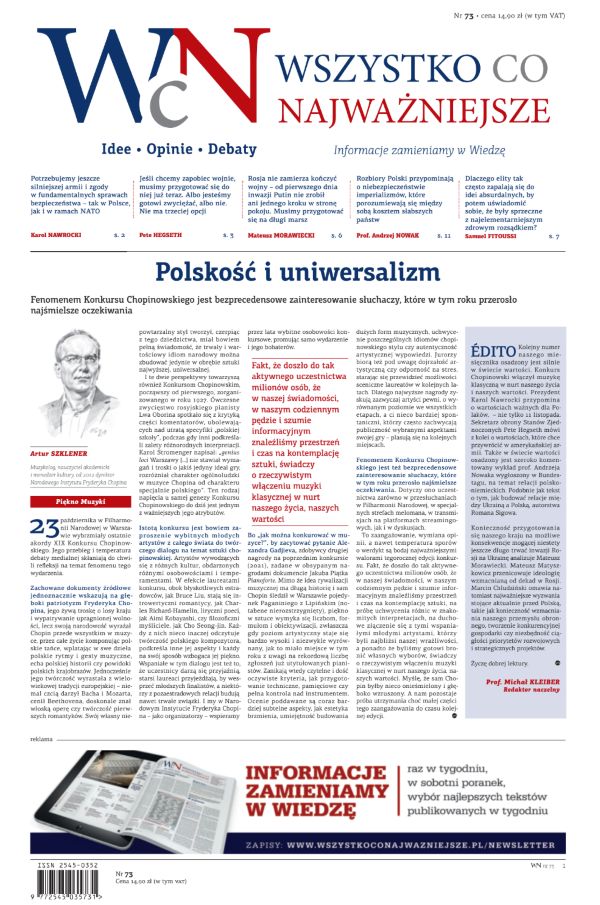 There is something to choose from when distributing climate costs
There is something to choose from when distributing climate costs
.Polish society faces enormous challenges in the coming decades. Greenhouse gases must be reduced and we are going to make the country resistant to floods, heat and drought. In addition, we will also suffer from increasing damage as a result of increasingly more extreme weather. This comes at a cost. Although exact amounts cannot be estimated reliably, there is no doubt that these 'climate costs’ will rise considerably in the near future. Policy measures are currently being intensified and the effects of climate change will be felt more deeply than before.
It is important that these climate costs are distributed fairly. An unjust distribution is disastrous for public support for any good climate policy, including the energy transition. The distribution of climate costs can be done in different ways. The Netherlands Scientific Council for Government Policy (WRR) has recently written a report on this topic, analysing just distributions of climate costs (WRR 2023). We are facing questions like: do we spread costs over all households in the
Netherlands, or should the climate costs primarily by highly emitting companies such as steel producer Tata Steel and energy company Shell? What is a just choice in this? Like the Netherlands, Poland is facing very similar question.
While the question is easily posed, the answer is complicated. Consider the following: it may be a good idea to reduce fuel consumption by raising the price, because the worst polluter pays higher costs. But when such measures come with dire consequences for citizens on a tight budget, for example because a car becomes too expensive for them, then you can ask yourself whether taking that measure to reduce consumption is really fair. A distribution that is perceived as unfair can lead to great social dissatisfaction, as was the case with the protests of the 'yellow vests’ (Les Gilets Jaunes) in France.
Research shows that climate policy is considered 'fair’ or 'just’ if the distribution of the burden
is fair (Dreijerink and Peuchen 2020). We call this distributive justice. But that does not give us the answer to a fair distribution. What is considered fair is inherently personal: one will find a distribution of climate costs in which citizens are spared fair, while the other will argue in favour of financially supporting households that have transitioned to a more sustainable life style. There is no single answer to the question of what constitutes a fair distribution. We give a few examples of what distributive justice can look like.
Distribution principles matter
.Most citizens think it is important that our tax money is spent sensibly. For every euro that benefits the emission reduction targets, we expect a maximum amount of CO2 emissions saved. For example, it has been approved in the Dutch climate agreement, signed in 2019, that the electricity sector will bear the greatest reduction task, because emissions can be reduced in this sector at the lowest cost. This sounds logical and fair, from the point of view that measures should have maximum benefit compared to their cost.
But, what is fair to one person may not necessarily be so to another. The division of the reduction targets is not quite in line with the equally embraced idea that a company or sector is responsible for its own emissions and the associated costs. If we focus on another distribution principle, that of 'the polluter pays’, then in the Netherlands the
electricity sector would have a considerably smaller reduction target while the industry-, agriculture- and construction sectors would have to invest more.
There are many examples in Dutch climate- and energy policy in which the costs are shared. Consider the discussion about the net metering scheme – should households receive subsidies for solar panels if the costs of that subsidy scheme are 'socially’ divided across all households? Such an approach would encourage sustainable behaviour and can certainly be justified from that point of view (Vollebergh 2022). But if we look at who ultimately bears the costs, we should also consider other distribution principles. After all, the result is that the energy bill of households without solar panels will increase, while households that have such energy-saving mechanisms installed benefit financially (Mulder and Straver 2023). The households that can afford, with or without subsidy, to have solar panels installed are often people who will need the aforementioned subsidy much less from a financial point of view. They already have a higher disposable income to acquire said solar panels.
Or take the differences in water system charges to keep the Netherlands dry. The Dutch water
boards are virtually self-sufficient financially. The inhabitants contribute to the services of the water board on the basis of profit. If you own a lot of land as an owner, you pay more for the protection measures against flooding. However, not every water board is equal in this respect: water boards in lower-lying areas on the coast face greater challenges than many others. For example, the sparsely populated water board Scheldestromen, in Zeeland (South-West of the country), is struggling with a major coastal protection task that is paid for in part (10%) by the residents of that water board. After all, they benefit from the dyke protection and it would be fair for them to pay for it, right?
But given climate change and rising sea levels, financing based on this principle may become much more challenging for this water board in the long term. A different division, in which the costs are not divided within each individual water board but between multiple water boards, may in such a scenario be considered more just. In that case, the capacity to pay for such costs will play a greater role. However, are residents of more wealthy water boards or those with lower costs prepared to share costs with those more exposed to climate change?
Fair distributions
.In the report Rechtvaardigheid in Klimaatbeleid: Over de verdeling van klimaatkosten (Justice in
Climate Policy: On the Distribution of Climate Costs), the Netherlands Scientific Council for Government Policy presents a total of ten principles for fair distributions (see figure), based on literature on ethics and philosophy (WRR 2023). Because a fair distribution of climate costs is important for public support, these principles must be explicitly considered when formulating climate policy. Do polluters have to pay for their emissions? Do people who are more sustainable deserve an allowance? Are citizens themselves responsible? Should everyone contribute the same amount or should the well-to-do contribute more?

Too little attention is paid to justice as a separate part of climate policy. If it does come up, it is usually as an afterthought. For example, if there’s an outcry about a certain distribution of resources. This happened in the Netherlands with the introduction of a subsidy scheme for electric vehicles, which became popularly knows as the 'Tesla subsidy’. If we would instead put the possible distributions on the table in advance, discuss them and finally choose a distribution in a well-argued way, much can be gained in terms of fairness and justness of climate policy.
With the ten principles, it becomes obvious there is more than thinking in terms of well-
known principles such as 'the polluter pays’ or 'ability to pay’ when it comes to justice. Wellconsidered thinking about the fairness of the distribution of climate costs, such as the investments required for the energy transition, is needed urgently. Climate policy, as well as climate change, concerns everyone and will affect everyone.
The ten principles therefore help to gain insight into possible fair distributions of the burden of realising climate policy. This then needs to be discussed, and the outcome of such a discussion can then form the guideline for the implementation of the policies. The answer to the question of what the best choice is, is up to society and ultimately it’s a task for politicians to choose. Therefore, the procedures that lead to these distributions are equally important. How were choices made and was this done in a fair manner? Research also shows that citizens are more likely to accept divisions that are disadvantageous for them if the procedure has been fair (Dreijerink and Peuchen 2020).
Distributive justice and procedural justice are thus linked.
Independent body
.Explicit attention to justice is essential to creating widespread support. But how are we going to organise and apply this in practice? First and foremost, climate policy should be seen as a matter of distributive justice, not just as a technical or legal challenge. Every policy decision, whether it concerns measures for the energy transition, flood-risk management or compensation for pollution, entails a cost allocation. The ten principles help to broaden policymakers’ and politicians’ thinking about justice. They should be incorporated in policy making on climate, and this should be done systematically and timely.
To ensure that the question of distribution of climate costs is and remains an important part of policy making, an independent body should monitor this. An institute with expertise in the field of climate policy and its effects. In the Netherlands, the Council of State (hereafter: CoS) is a logical actor for this, because it’s currently already involved in the legal assessment of climate policy, including in evaluating its costs. The WRR advocates adding the justice perspective to the assessment of the climate act. Are well-considered considerations made in policy on what constitutes a fair distribution of costs?
.The protests of Les Gilets Jaunes were originally aimed at climate policy, which was thought to be unfair to ordinary citizens. While these protest were limited to France, similar discontent among citizens is bubbling up everywhere. After all, justice is what affects citizens. Citizens often find a fair distribution of climate costs even more important than a rapid CO2 reduction, according to research (I&O Research 2022). It is therefore high time to organise early and systematic attention for this.
Suzanne Hulscher
Annick de Vries
Victor Toom
References
Dreijerink, L.J.M. en R.A. Peuchen (2020) Maatschappelijk draagvlak voor klimaat-en energiebeleid.
Resultaten van een vragenlijstonderzoek. Amsterdam: TNO. Available on:
https://publications.tno.nl/publication/34636533/Bq83Sb/TNO-2020-P10030.pdf.
I&O Research (2022) Rechtvaardigheid in klimaatbeleid. Amsterdam: I&O Research. Available on: https://www.ioresearch.nl.
Mulder, P., and Straver, K. (2023). Energiearmoede is een governance vraagstuk. Available on: https://energeia.nl/energeia-artikel/40105638/energiearmoede-is-een-governance-vraagstuk. Vollebergh, H. (2022a) ‘Economisch beleidsmatige aspecten aan groene heffingen en belastingen’, Tijdschrift voor Fiscaal Ondernemingsrecht, 181(1): 87-97.
WRR (2023). Rechtvaardigheid in klimaatbeleid: Over de verdeling van klimaatkosten.
Wetenschappelijke Raad voor het Regeringsbeleid: Den Haag.




